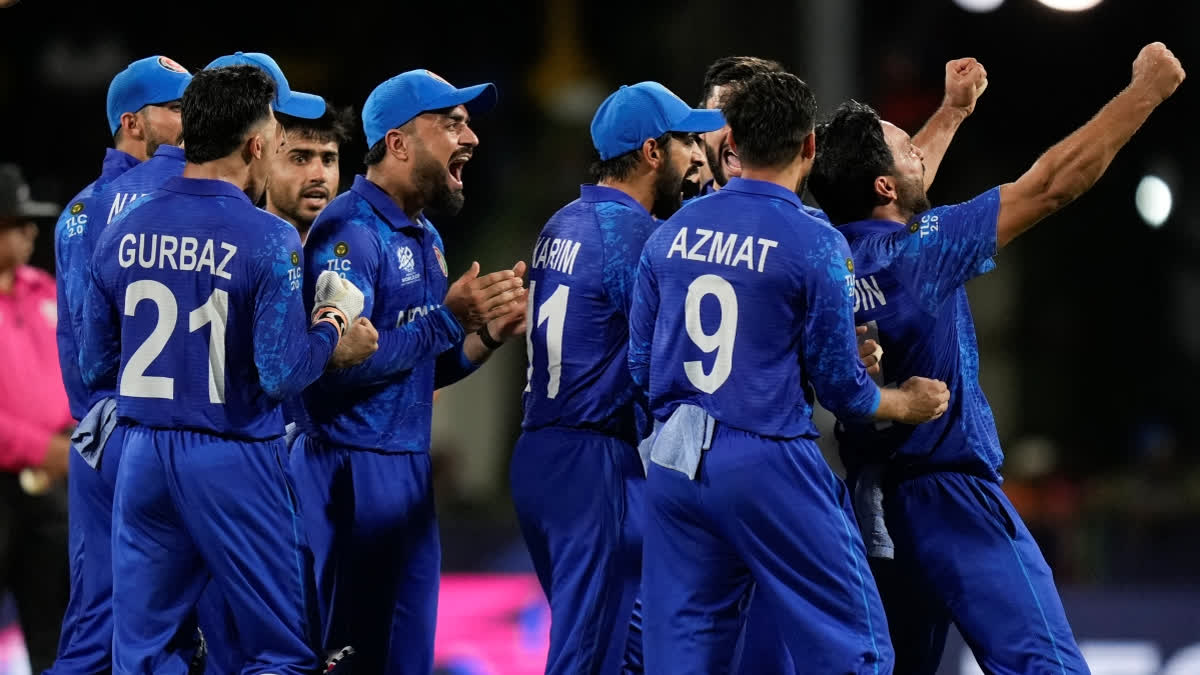Tarouba (Trinidad): The proud Afghans led by Rashid Khan broke down; they cried; they sobbed; they hugged, and they took victory laps — the proudest moment in their life perhaps, a well-fought, well-earned, well-deserved entry into the semi-finals of a T20 World Cup. It was almost as if the purest form of passion propelled the last two wickets in the last over. It could have gone any which way — 9 runs in 8 balls.
But Bangladesh could not stand up to the fierceness and ferocity of intent of Khan's band of warriors; they could not face the backroom manoeuvres of homeboy and bowling consultant of the Afghanistan team, Dwayne Bravo. When Afghanistan showed an unusual inertia with the bat scoring just 80 odd runs in 15 overs, it seemed they would lose and Australia would get a back door entry into the semis, after all.
At the Guyana airport, every passenger stopped to watch the match and cheered for Afghanistan like never before, at midnight. The fans were Indians, West Indians, Brits and a whole lot of airport officials.
It is with all this passion, intent and support that Afghanistan will play its first-ever semi-final of a summit tournament, against South Africa, another nation that has been on a desperate journey to get a Cup to sip from. But this World Cup is the story of the Afghans, not so much of South Africa who have faced so many similar outages at the World Cup.
For Afghanistan, since their entry into the game in 2004, it is the juice of first coming of age as 20-year-olds that is acting as a major propeller to fight impossibilities. And impossibilities they've had many, being overawed by the occasion could be one. The other more stated ones are an iffy middle order, over-reliance on their openers, and lack of experience at the top level. But then, when has Afghanistan's cricket not tided over hurdles with resilience, hope, and unyielding spirit? From war-torn landscapes to cricketing glory, the team symbolises a nation's dreams and aspirations.
Cricket, for Afghanistan, is more than a game; it's a beacon of hope and unity. In 2004, they played their first official fixture in the Asian Cricket Council Trophy. Twenty years later, they defied all odds by reaching their first World Cup semi-final in the biggest World Cup featuring 20 teams.
Their meteoric rise in just two decades, achieving what many teams might take half a century to accomplish, is a testament to their raw talent, elite skills, and continuous improvement thanks to global T20 exposure.
Their captain and lead spinner, Rashid Khan, embodies their fighting spirit. He is one of the most sought-after T20 players in the world. Noor Ahmad, their second spinner, complements Rashid with his left-arm spin, while opener Rahmanullah Gurbaz can dominate the powerplay better than the biggies.
Fazalhaq Farooqi is a force that has emerged to join the rank of monster pacers and Naveen-ul-Haq, under the guidance of bowling coach Dwayne Bravo, has become a crucial player with his variations on pitches that Bravo knows the inside out of.
Age is no bar here. The oldest to take guard tomorrow will be Mohammad Nabi, the guy who is turning 40, played the first official match for his team in 2004, and his son debuted for the under-19 team World Cup team! Nabi has defeated 45 teams in his career and will now look to add South Africa to that list.
The statistics, too, favour the Afghan surge. They have taken the most wickets at 57 scalps in this World Cup, their economy rate being second only to South Africa's. Their openers flower while batting first but are cagey when chasing, something that they hope their skipper will set right by winning the toss at Trinidad.
So, it will be more about their fierce desperation than their skill that will give them the belief to tide over a dangerous finger spinner Keshav Maharaj on a Tarouba surface as also the turns and twists that wristy destroyer Tabraiz Shamsi can manage.
Going by the stars that have aligned to highlight an Afghan presence, their Travis Head slayer Naveen-ul-Haq who bowled a hall-of-fame delivery to get him out, adds up to Rashid Khans' unparalleled thought processes around his spinners.
"For us, it's a new challenge and I think that makes us dangerous in the semi-finals as a side with nothing to lose and obviously a lot of pressure on the opposition," their coach Jonathan Trott said.
Perhaps, he is the only matter-of-fact voice in the squad. The rest are talking – animatedly both with the bat and the ball, with huge gaps to cover, but no room for anything less than the most ardent, fervent, impassioned, eager and heartfelt bid to reach where no Afghani has reached before.
Read More



